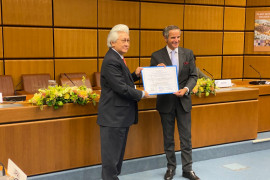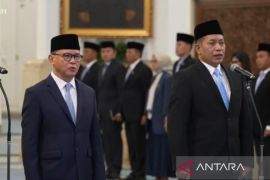According to the FAO Director General Jose Graziano da Silva, Indonesia is one of 19 countries that rated successful in reducing malnutrition, from around 20 percent of its total population of 240 million in the decade of the 1990s to 8.6 percent inJakarta (ANTARA News) - For its success in reducing the number of hunger, Indonesia received an award from the United Nations` Food and Agriculture Organization (FAO) in Rome, Italy, on Sunday, June 16, 2013.
The award was received by Coordinating Minister for Economy Hatta Rajasa in an Special Event on "Recognizing Notable and Outstanding Progress in Fighting Hunger" which is part of the 38th FAO Conference in Rome from June June 15 to 22.
But Rajasa said the award was not the end of the homework Indonesia has to do, because the country would continue to firmly hold its commitment to fighting against poverty, hunger, and malnutrition.
"The Government of Indonesian will continuously try to create a conducive environment to support the eradication of poverty, hunger and malnutrition in the country," Radjasa said after receiving the award from FAO.
According to him, the government is currently focusing on the development of agriculture sector and the empowerment of people living in the village.
Among efforts made to support the plan are extension of bank loan facility for small and medium enterprises, increase social service for the poor, promote food diversification as an effort to tackle possible food scarcity.
FAO presents the award to Indonesia for Indonesia achievement in fulfilling first target of Millennium Development Goals (MDGs) related with effort to decrease the number of citizen suffering from hunger.
According to the FAO Director General Jose Graziano da Silva, Indonesia is one of 19 countries that rated successful in reducing malnutrition, from around 20 percent of its total population of 240 million in the decade of the 1990s to 8.6 percent in 2012.
The award given by FAO is based on two categories: the first category, outstanding result, which is given to countries that managed to reach the targets of MDGs or World Food Summit (WFS) in 1996; and the second category, notable result given to the countries that succeeded in reaching the MDGs targets in terms of poverty reduction efforts.
On this occasion Indonesia includes in the both categories of the award basis.
In its history, this award is the second that is given by FAO for Indonesia after the first in 1985 for its achievement in rice self-sufficiency.
During the same year Indonesia extended a US$7 million grant for farmers of Africa to help them cope with along drought in the continent.
Indonesia joined the Food and Agriculture Organization in 1949, and as an active participant in the work of the organization, it has seen the FAO change structure and evolves in stages.
As its contribution to global food security, Indonesia has taken various initiatives and has led in the promotion of national capacities and in strengthening international collaboration in various frameworks of cooperation at bilateral, regional, and multilateral levels.
Indonesia is firmly committed to strengthening global efforts to combat poverty and food insecurity with effective, competent, and reliable global food governance.
It is also working hard to help enhance the critical role of FAO as a component authority to lead the global response to the pressing challenges of global food security.
"Therefore FAO is proud to work with all our Member Nations, developed and developing, to reach our common vision of a hunger-free and sustainable world," FAO`s Director-General Jos� Graziano da Silva said.
The Director-General pointed out that there were 928 days until the 2015 MDG deadline, but he urged countries to go beyond that and aim for the complete elimination of hunger.
"We are the first generation that can end hunger, which has plagued humanity since the birth of civilization. Let`s seize this opportunity," he said.
Graziano da Silva said strong regional commitments were supporting national anti-hunger efforts. He also thanked the international donor community for helping to initiate and scale-up successful hunger-fighting actions in numerous countries.
The FAO chief also pointed out that 15 developing countries already had hunger rates below 5 percent dating back to at least 1990: Argentina, Barbados, Dominica, Brunei Darussalam, Egypt, Iran, Kazakhstan, Lebanon, Malaysia, Mexico, Republic of Korea, Saudi Arabia, South Africa, Tunisia and the United Arab Emirates.
In a report released early this month, FAO called for resolute efforts to eradicate global malnutrition and hunger.
According to the report, two billion people suffer from one or more micronutrient deficiencies, while 1.4 billion are overweight.
The report underlined that while some 870 million people were still hungry in 2010-2012, this is just a fraction of the billions of people whose health, well-being and lives are blighted by malnutrition.
It also notes that 26 percent of all children under five are stunted and 31 percent suffer from Vitamin A deficiency.
The agency noted that, in social terms, child and maternal malnutrition continue to reduce the quality of life and life expectancy of millions of people, while obesity-related health problems, such as heart disease and diabetes, affect millions more.
The key to combating malnutrition is healthy diets and good nutrition -- which must start with food and agriculture, stressed FAO.
The report proposed a number of recommendations, including using appropriate agricultural policies, investment and research to increase productivity; cutting food losses and waste, which currently amount to one third of the food produced for human consumption every year; and helping consumers make good dietary choices for better nutrition through education, information and other actions.
Among other recommendations is to make food systems more responsive to the needs of mothers and young children.
FAO noted that malnutrition during the critical `first 1,000 days` from conception can cause lasting damage to women`s health and life- long physical and cognitive impairment in children.
Making food systems enhance nutrition is a complex task, the report pointed out, adding that it requires strong political commitment and leadership at the highest levels, broad-based partnerships and coordinated approaches with other important sectors such as health and education.(*)
Reporter: Otniel Tamindael
Editor: Heru Purwanto
Copyright © ANTARA 2013











